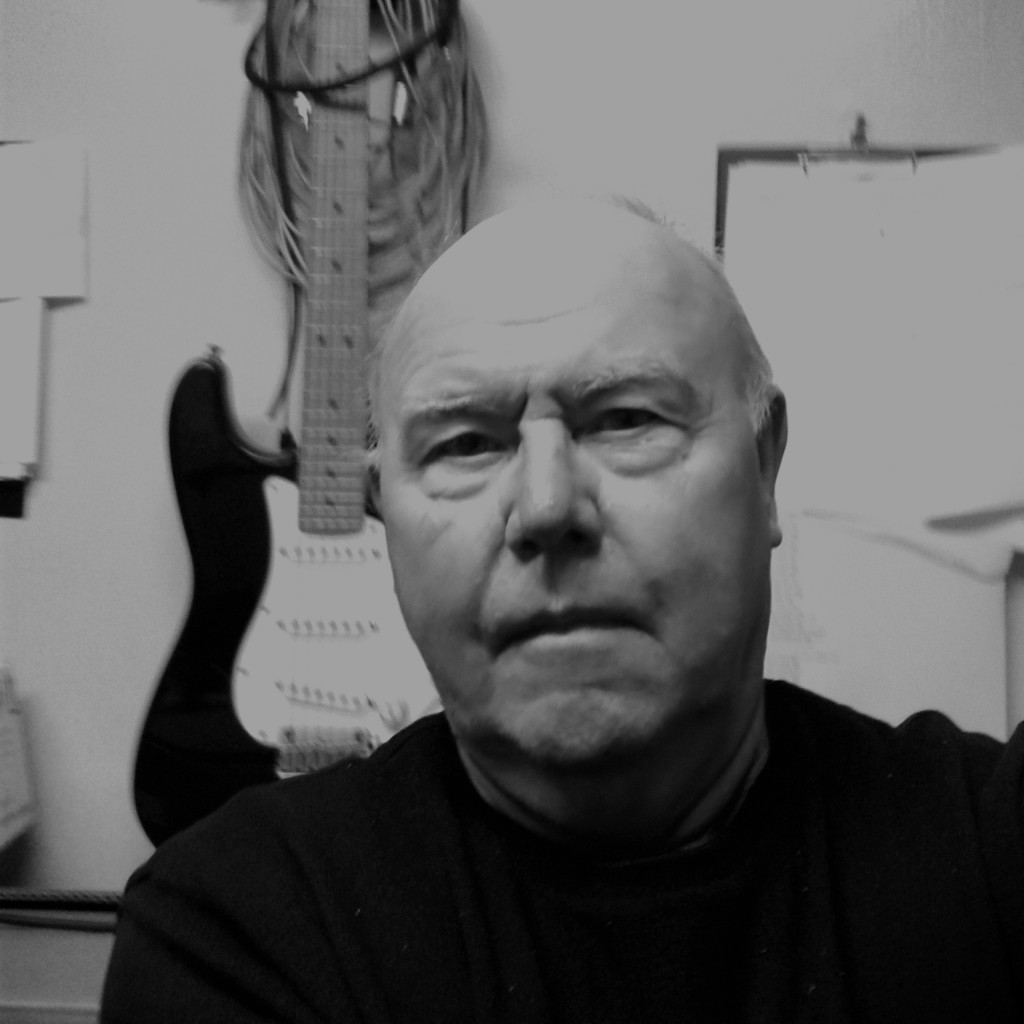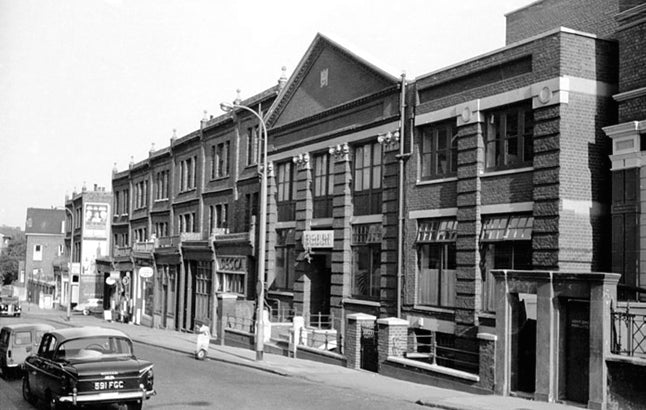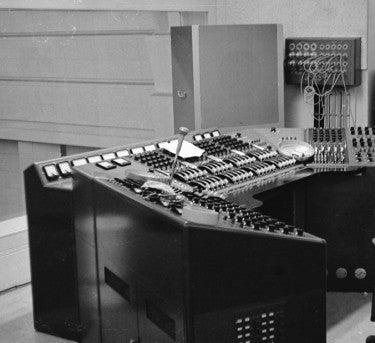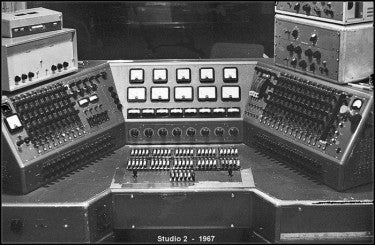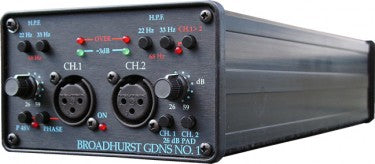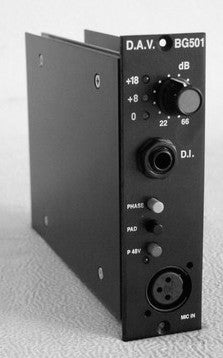Designer Talk : Mick Hinton | D.A.V Electronics
Mick Hinton is the man behind D.A.V Electronics based in West London. Having worked at Decca Studios for over 29 years he launched his range of Broadhurst Gardens ( BG ) in early 2001 and has now grown his product catalogue to include EQ’s, Compressors, Summing, Re-amps, Guitar Control Room Interfaces and Monitor controllers. All of these feature the same low noise designs, and are handmade in the UK proving popular with established artists and studios such as British Grove, David Gilmour, Metropolis and The Exchange as well as many clients worldwide.
I caught up with Mick to find out how it all came about, and his ideas behind the designs.
So Mick were you always into sound and designing or was it from experimenting with electronic equipment that got you started?
Well, years ago when Hi-Fi first started people had Radiograms but they never really sounded that good if you compared it to somebody who had a Hi-Fi setup.
So I built my first set of speakers after getting a book ‘ Loudspeakers’ by G.A Briggs and connected them to a Radiogram and it was a 100% improvement in the sound and that got me started.
Did you start recording music or just loved listening to it?
I’ve never recorded in my life, I’ve always played Guitar, but I’ve always liked music and especially the sound, the Hi-Fidelity sound, and you couldn’t get that unless you bought separate amplifier, turntable and a speaker setup, you just couldnt get that in a Radiogram or Record player on their own.
First of all I bought Japanese valve power amp in the 60’s, then a preamp and power amp, then a Rodgers transistor setup and then I started building my own equipment. When I started working for Decca obviously all the components were available, so I built amps for Decca and built one for myself as well.
How did you get the job at Decca ?
I wrote three letters, one to Decca, one to EMI and one to CBS, as they were the only Studios around in London really that I knew of.
Decca replied and I went for a walk around the studios. It wasn’t an interview or anything I just went for a walk around and they asked “what are you interested in”, and I said Hi-Fi and that I’d been studying electronics for 3 years, and the guy just said “yeah you’ve got the job.”
I went to see the boss Arthur Haddy, they never had a salary scale at Decca, he just said what he thought on the day really, he said “how much you getting now?” and I said £10 a week and he said ” well we’ll put you on £20″. So I said yeah that’s great.
When I started working at Decca I found out that I was earning more than some people who had been there for 10 years! It was a while afterwards that we all got involved with unions and things like that as everyone was all earning different money.
I got a reply from Abbey Road and CBS, but I’d already accepted the job at Decca, which was a good move as I was there 29 years. I don’t think I’d have been at Abbey Road that long or CBS!
I joined in 1969, and when I got there Decca was just going into Stereo, as everything earlier up until then had been in mono – as they’d been going a long long time since before the 1940’s.. Most of the people working there were ex-Army and ex-RAF, they were all ex Radio Operators.
Was it all white lab coats everywhere?
Brown coats!!…and the Tech staff wore White coats! But when I joined I wore a coat for about a month, then I though oh sod this! – because if you walked into a studio with the band and you came in wearing a coat they thought there was something seriously wrong! – so I ditched the coat and then you could play cards and have a chat with them.
I’m thinking maybe I should have a white lab coat in my studio…
oh yeah, I put one on here when I’m making my gear all the time…haha..
As you were in design and maintenance at Decca, did you make products as well for other people ?
I remember making something for The Bachelors, the group, they used to have strings on stage and it used to cost them quite lot of money for 4 or 5 violin players, so I made them an echo device which made 1 violinist sound like 5 – and it saved them a fortune when they were touring.
So how did Decca eventually come to close ?
Well we were making our own equipment at Decca, and soon in the digital world it was far more difficult to make digital equipment than in the analog world, as purchasing it elsewhere eventually for less became an option.
Decca was also purely doing Classical music, as we’d been taken over and the Pop side went somewhere else, and classical music wasn’t selling that well. It used to cost a lot of money to send a team of technicians to Vienna with a couple of multitracks or whatever and stay there recording for 1 or 2 months.
When did you leave Decca ?
When Belsize Road Studios closed, they kept me on until the last as they were still editing stuff, they needed a maintenance engineer there, When everyone left I stayed for another 3 months, it was about 1998, when Decca closed actually.
How long afterwards did you think of doing the D.A.V thing?
Oh I’d already done it, a friend of mine was into video and had a video company and I was doing the audio design for him – and I’d designed a 24 channel audio mixer for TV and made a couple of them, and built them in conjunction with my friend. Something I started doing about 4 years before Decca finished as I’d always repaired audio equipment as a side line as Decca was always a passion ‘hobby job’.
Was that when D.A.V started ?
Yes, but I just make customer equipment that anybody wanted, amplifiers etc – I’d make stuff for people like the Moody Blues, the Bachelors, repairing stuff and making pedals and it just grew as a part time job alongside Decca into Digital Audio Visual Electronics ( D.A.V ).
When Decca closed I was purely in maintenance repairing U-matics, like DMR2000’s, DMR4000’s and I was used by all the mastering places in England, The Exchange, Abbey Road, Metropolis as there was nobody around who could repair these U-matics. But then that slowed when people went over to things like Sadie, so I thought I better do something else, and I then designed the Broadhurst Gardens 1 ( BG1 ).
Was the BG1 designed for someone specifically?
I’d actually designed it for Decca, I built many 4 channel mic amps for us there and when I left I didn’t think of carrying it on, I was just doing maintenance which was great. Then it was only a few years later it dried up a bit so it was then I started making them.
I then got an email from a guy in the states called Hudson Fair, he had a recording company over there, and he read an interview in the Gramaphone magazine where an ex-Decca engineer had mentioned that he’d bought a mic preamp from me. He was called Simon Eadon, and I was calling it the ‘Crystal Clear’ mic amp at the time, and Hudson Fair bought one, a four channel version – and i sent it to him and he said it was the best mic amp he’d heard. He got onto Gearslutz telling everybody about it, and it all started from there.
I never advertised anywhere, and then about a year later KMR came to me and raised the profile, but it was this guy in the States who started it for me, and he’s still on Gearslutz talking about my gear. It was pure luck, but I really appreciated it.
( Hudson Fair, is a Grammy winning Classical Recording Engineer with over 34 years in the recording industry with over 370 releases. )
I know many studios use the DI as well as the mic-pre on the 500-Series version the BG501, as they prefer your clean approach – I would say it’s musical…
I should have called all my stuff ‘Crystal Clear ‘ which would have described it better! – but then again people do say it has ‘colour’. So everybody can decide themselves really.
What are you most proud off – is it the BG1 as it started it all off?
Yes as the BG1 is what started it all off, and they’re still going strong alongside the BG501 for the 500-Series format and the BG1U Rack.
Do you prefer to make everything by hand ?
Yes as it’s the quality control I can look after – there was a time when I used to have a wireman when I was really busy, and then I’d finish them off myself, and I do have a couple of other people who work for me, but the QC is all done by me here in-house.
The metalwork is made in the UK, it’s all British made by a company called Bryant Broadcast, the only things that I buy that aren’t British are the switches, they’re Greyhill switches from USA and high quality.
Bryant are more of a video company, but they have a nice metalwork company there, and I send them a drawing and they come back really well.
Why do you think your design stands up so well against other product that are sometimes 2-3 times the price ?
The philosophy at Decca was ‘ the simpler the better’. If there was an electronic piece of kit that was good, why make it yourself, if it was good? – Also it makes it easy to service, especially when sending products all around the world.
Sometimes there is so much labour involved in making equipment, so you can understand why certain products are made in China. But when they need servicing or repairing the cost can be unappealing to the customer due to the work involved.
What’s the most labour intensive, or complicated design you make ?
The most complicated thing I build is the BG4 Limiter, as it’s got transistors in it.
Both the BG4 and the BG7 is the Decca limiter, which is discrete and IC, and it’s quite a complicated limiter which is the original 1976 design. But this design was used on all Decca Masters in Classical, Pop and Rock.
Your equipment has always impressed by how good it sounds – the appearance is definately functional, but then that’s quite appealing don’t you think ?
Yeah, the thing that could let my gear down, is the front panels – But if I had a more ‘professional’ front panel the metal work costs a lot, and it would be more money to make it, say ‘more attractive’ – and it would probably double the price at least.
I think it’s good to know that where the money goes is on the inside rather than the outside.
Yes, my philosophy is just very low noise distortion. If you want distortion add it after you’ve recorded it!
How do you keep coming up with ideas and designs like the S.I.P.P and the Control Room Guitar Interface?
Mainly it’s engineers and people, for example, like the engineers at British Grove, who I’ve known for years. They’ll ask me to design a few pieces of gear, and then I see how they sound and work. Then sometimes I take a design forward and develop it. Which was how the Monitor Controller came about, as they’ve got about 5 of them.
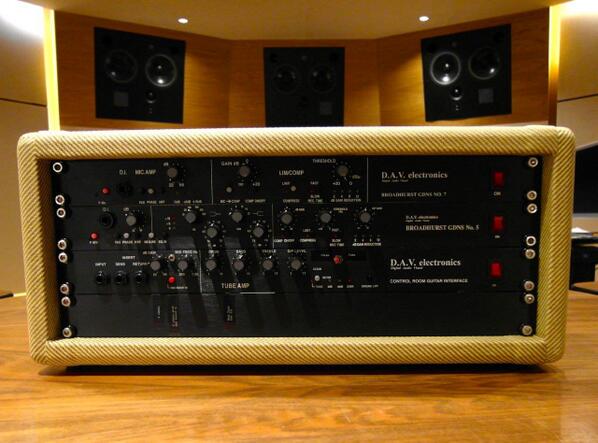
I actually build my own volume controls, I have a company in England that I deal with, and they give me the wafers, I match them up and then send them back and they make a pot out of the two wafers. This way I can get them to be matched to within 0.5db.
On my monitor controller there are two stereo matched pots, one on the headphones and one on the speakers. If I used switches there it would cost a lot more money, but this way I match the wafers here, pair them up, and then they put the spindles on.
Is being aware of design costs something you picked up from Decca or for yourself with D.A.V ?
Oh doing it myself! – as at Decca costs didn’t come into it, they were just make it, whatever ! I’ve been buying stereo pots for years now, but they’re never really matched, and if you want a good left right image you can’t use a cheap pot.
This is really interesting, as you’re keeping the quality but also making sure the price isn’t unrealistic…
Yes that’s why all my amps use switches, except for the monitor controller of course, I mean you can go to companies like Alps in Japan and they’ll make you a stereo pot but then they want you to take quantities of like 2000.
I try to make the best equipment I can, at a reasonable cost because if I used the Decca cost philosophy of ‘cost doesn’t matter’ – then people may not want to buy it.
Do you do modifications of your current products for clients?
I’ve had the occasional mastering engineers using my BG3 EQ ask for requests and I’ve done mod’s for them, where they want 0.25db or 0.5db steps. So I can do specific versions for clients should they need things changing, but generally my EQ’s are popular as they are.
The BG504 limiter/comp is your new design for the 500-Series?
Yes the BG504 is an optical compressor, more like a Fairchild or something like that. It’s clean, very very low distortion but it’s not as fast as the Decca one… there’s a slight delay on the Optical side. It’s slower, and doesn’t operate as fast, but it’s very musical.
Are there any products you wish you’d designed or thought, I wish I’d come out with that?
I was thinking about it for years as I was thinking of a tape simulator. I was going to do it, as it’s fairly easy, but I won’t bother now, it would have been an interesting design. The only thing with my sound now is all my gear is based upon low noise, low distortion and then they’d be me putting out something with loads of white noise! – so I decided not to do it.
What’s been your biggest challenge you found designing and making your own gear ?
Well, when I was really busy, I couldn’t go out much! – but now the orders are more manageable and I have enough time to balance it all really.
Finally Mick, your Studio / workshop is burning down and you can grab three things!…what and why?
Well, it’d be :
- The Audio Precision System One – it’s a computerised audio test set, it does all the frequency responses, noise, distortion – everything. I can work without it with a meter, but this is so much easier…
- My Hardrive – with all my designs and everything on it..hopefully!
- My classic US Black Fender Strat – it’s hanging on the wall in my workshop and I test all my DI’s with – it’s the only time I play it!
Isn’t that ‘overkill’ having a classic Strat just testing your DI’s?… haha
Haha yeah…I’ve got a Les Paul as well though, and funny story is the Gibson I got when i’d just been made redundant from Decca, I saw it in London and bought it. Then went back a few weeks later to buy some strings and things, and they told me that they’d sold it to me without their mark-up on it – they’d sold it to me at cost!
Thanks for the interview Mick!
FONTE: https://www.kmraudio.com/news/designer-talk-mick-hinton-d-a-v-electronics/
Julian Ludwig é diretor do Pro Áudio Clube, produtora de áudio Jacarandá, Loc On Demand e Jacarandá Licensing. Trabalhou para empresas como: Guaraná Antartica, TV Gazeta, NET, Chivas Regal, FNAC, Prefeitura de São Paulo, Mukeca Filmes, Agência LEW’LARA TBWA, Agencia MPM, Agência Content House entre outras. Fez trilhas para programas de TV como: Internet-se (Rede TV), Você Bonita (TV Gazeta), Mix Mulher (TV Gazeta), Os Impedidos (TV Gazeta), Estação Pet (TV Gazeta), CQC (TV Band) Vinheta Oficial TV Gazeta, entre outras. Também atuou em vários longas e curtas metragens, incluindo mixagem em 5.1 e serviços de pós-produção.

